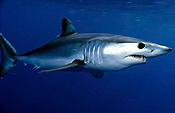World's First International Shark Fishing Limit within Reach at Atlantic Tuna Body
Conservationists urge Commission to seize historic opportunity and protect threatened species
 © Jeremy Stafford Deitsch
© Jeremy Stafford Deitsch
The Shark Alliance is highlighting the extreme vulnerability of the Mako Shark.
On the eve of the annual meeting of the International Commission for the Conservation of Atlantic Tunas (ICCAT), the Shark Alliance is urging member countries to agree fishing limits for the Atlantic’s most vulnerable shark species, targeted and taken incidentally in international tuna and swordfish fisheries.
Later this week, ICCAT Parties will receive an unprecedented amount of scientific advice regarding the overfishing risk of oceanic sharks which are taken without limit in international waters. If ICCAT agrees international fishing limits for even one species of shark, it would be the first such action in the world. The Shark Alliance is highlighting the extreme vulnerability of thresher, porbeagle and mako sharks and asking that they be treated as priority species for conservation action.
“Sharks are among the most vulnerable and neglected species of the Atlantic Ocean,” said Sonja Fordham, Shark Alliance Policy Director. “New, scientific reports offer clear guidance for initiating urgently needed, international shark conservation efforts in the Atlantic. We urge ICCAT Parties to protect exceptionally vulnerable thresher and porbeagle sharks and reduce fishing for mako sharks without further delay.”
Scientists recently examined the population status and overfishing risk of eleven Atlantic shark species. These analyses demonstrated that most of these species have exceptionally low rates of population growth and, as such, can become overfished even at very low levels of fishing. Scientists are recommending that ICCAT consider mandating the release of particularly vulnerable shark species.
Scientists identified the bigeye thresher shark as the oceanic shark with the highest risk of overfishing based on its slow rate of reproduction and susceptibility to oceanic longline fishing gear. This species was highlighted as the top candidate for protection through ICCAT because it is easily identified by fishermen, of low commercial importance, and survives well if promptly and carefully released from fishing hooks.
The porbeagle shark is likely the most seriously depleted oceanic shark species in both the Northeast and Northwest Atlantic. EU scientists have recommended a ban on landing this species. Canadian scientists had estimated the recovery period for Northwest Atlantic porbeagles at 100 years, but recently predicted that catches from a new, international porbeagle fishery will crash the population. Porbeagles are also known to survive well after release from longlines. Directed porbeagle fisheries persist in Canada and France while boats from Spain and the UK target the species opportunistically.
Because of poor catch information, the population status of blue and shortfin mako sharks is uncertain, although some analyses for North Atlantic shortfin makos estimate depletion at 50% or more since the ’50s.
The Shark Alliance is calling on ICCAT to:
- Prohibit the retention of exceptionally vulnerable bigeye thresher and porbeagle sharks;
- Reduce fishing pressure on shortfin mako sharks;
- Set a precautionary cap on blue shark catches, to be revised when safe fishing limits are determined; and
- Close loopholes in the shark finning ban by prohibiting the removal of shark fins at sea.
“Waiting to act until population assessments are certain leaves sharks at great risk for long-standing depletion,” added Sandrine Polti, Fisheries Policy Advisor for the Shark Alliance. “Action based on scientific advice is necessary to prevent population collapse and to ensure that fishing pressure on these slow-growing species is sustainable.”
Notes to editors
The Shark Alliance is a coalition of 58 conservation, scientific, and recreational organizations dedicated to improving European shark fishing policies.
ICCAT is responsible for the conservation of tunas and tuna-like species in the Atlantic and adjacent seas. Currently, ICCAT has 46 contracting parties including the European Union.
Most sharks grow slowly, mature late, and produce a small number of young and are therefore more susceptible to overexploitation and depletion than other species taken in ICCAT fisheries.
Several species of oceanic sharks, particularly porbeagles and makos, are prized for their meat and fins and, as such, are targeted and often retained when taken incidentally. ICCAT requires the reporting of shark catches, but many countries are not complying.
In 2007, ICCAT Parties, except for Canada, agreed to reduce fishing pressure on North Atlantic shortfin makos and porbeagle sharks, but stopped short of setting any specific restrictions on fishing these species.
“Finning” is the practice of slicing off a shark’s valuable fins and discarding the body at sea. ICCAT was the first international fisheries body to prohibit this wasteful practice (in 2004), but the ban is imposed using weak enforcement standards, including complicated, excessive and unreliable fin to body weight ratios.
On October 27th, The Lenfest Oceans programme released a report entitled Management Recommendations Based on Integrated Risk Assessment of Data-Poor Pelagic Atlantic Sharks, in response to research demonstrating that ten species of Atlantic sharks currently have a high risk of being seriously overfished.
The Lenfest Ocean Program brought together shark experts from Australia, Belgium, Croatia, South Africa and the United States to develop recommendations in part to help the International Commission for the Conservation of Atlantic Tunas (ICCAT) make better management decisions for Atlantic pelagic sharks. To see the recommendations, read Lenfest Research Series summary of the report or view the full report, visit www.lenfestocean.org.






